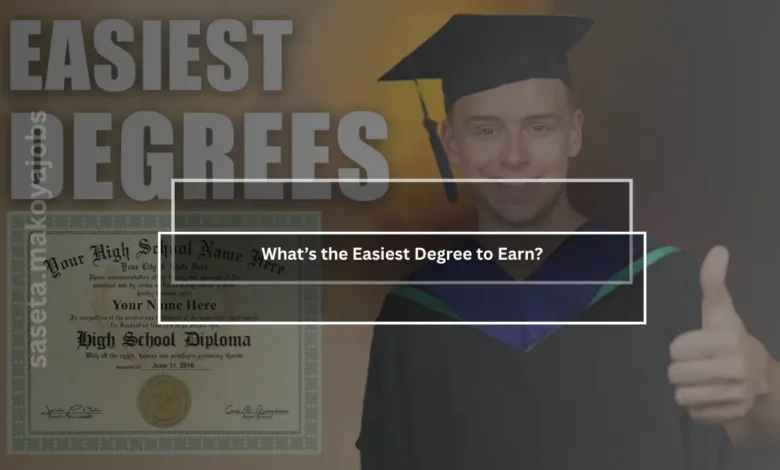What’s the Easiest Degree to Earn? A Balanced Guide to Choosing Your Path

Looking for an easier degree to earn? Explore approachable options like BA, BEd, BCom general, BAAS, and fast-track diplomas in South Africa.
If you’re exploring tertiary education options and seeking a more manageable path, you’re not alone. Many students wonder which degrees are the “easiest” to complete—those that align best with personal strengths, offer flexible formats, and lead to meaningful outcomes.
While “easy” is subjective, some degrees are more accessible due to structure, content, or support systems. Let’s explore the most approachable options in a clear, reader-friendly way.
What Makes a Degree “Easy”?
Several factors influence how demanding a degree is:
- Low-level math or technical content
- Essay and project-based assessment over exams
- Flexible delivery methods like distance learning
- High pass rates and institutional support
- Subjective grading in creative or humanities topics
Now, let’s look at specific degrees often considered more manageable.
1. Bachelor of Arts (BA) in Humanities
Why it’s accessible: Focused on essays, cultural analysis, and creativity rather than technical theory. Courses often tap into interests like storytelling, history, or sociology.
Completion rate: Typically higher than STEM fields—60–70% finish within six years.
Why people choose it: Supports critical thinking and writing skills and allows easy switching between majors due to elective flexibility.
2. Bachelor of Education (BEd) – Foundation Phase
Why it’s approachable: Built on schooling knowledge and practical teaching experience, many BEd programmes involve school-based practice over theoretical exams.
Support systems: High completion rates—around 90%—reflect strong institutional frameworks.
Career outcome: Leads directly to teaching roles while offering a streamlined path for aspiring educators.
3. Bachelor of Social Science or Communications
Why it’s manageable: Includes subjects like sociology, psychology, media, or public relations. These typically favour essays, group projects, and presentations.
Flexibility: Broad electives allow students to play to their strengths.
Application: Ideal for careers in communications, media, policy, or administrative roles.
4. Bachelor of Commerce (General Stream)
Why it’s approachable: Unlike specialized commerce degrees, the general stream avoids heavy accounting and tax theory. It emphasizes business concepts, management, and case-based learning.
Why people opt for it: Offers solid commerce knowledge with less math-heavy content.
Career paths: Opens doors in business operations, retail, management, or entry-level corporate roles.
5. BA in Communication Studies
Why it’s accessible: Revolves around writing, media, presentation, and creative projects more than technical theory.
Learning method: Emphasizes hands-on assignments like media briefs, campaigns, and digital storytelling.
Potential careers: PR, journalism, content creation, social media strategy.
6. Bachelor of Applied Arts and Sciences (BAAS)
Why it’s accessible: Designed for working professionals, this offers practice-based learning, flexible schedules, and often offers credit for prior learning or experience.
Why it’s considered easy: Less competitive admissions, streamlined graduation timelines, and many online or part-time options.
Best for: Students returning to study, professionals completing earlier degrees, or those needing a flexible format.
7. Interdisciplinary or Independent Studies Degrees
Why they work: Allow students to choose a broad course of study, combining multiple topics. Many institutions offer modular learning tailored to personal goals.
Advantages: Especially useful when transferring credits or combining practical experience with academic learning.
Ideal for: Adult learners or students with unique career goals not matched to traditional programmes.
8. Fast-Track Diplomas and Certificates (South Africa Focus)
If you want the quickest path to a credential, consider:
- Higher Certificate in IT (1 year): Focuses on computer literacy and basic tech skills.
- Diploma in Digital Marketing (1–2 years): Covers SEO, social media, and content creation.
- Higher Certificate in Business Management (1 year): Focuses on entry-level business knowledge like organisation and basic finance.
These options offer strong ROI and faster entry into the workforce, especially via distance learning.
Student Voice: Reddit Insight
A student on Reddit compares pathways:
“BAAS programs are the fastest option; they often allow credit transfers and flexible scheduling for working adults.”
This reflects how experience-rich and self-paced programmes resonate with learners seeking efficient completion.
Summary Table
| Degree Type | Why It Feels “Easy” | Typical Outcomes |
|---|---|---|
| BA in Humanities/Communication | Essay-based, low technical demands | Writing, media, admin careers |
| Bachelor of Education (BEd) | Familiar teaching context, practical focus | Teaching profession |
| General BCom | Less math-heavy, broad electives | Business admin, entry-level corporate roles |
| BAAS / Independent Studies | Flexible, credit for experience | Specialized roles or blended careers |
| Fast diplomas (IT, Business) | Short duration, focused content | Workplace entry in high-demand sectors |
Final Thoughts
No single “easiest” degree suits everyone. The best choice depends on your strengths, career interests, and learning style. Humanities and education degrees are often seen as accessible due to ease of content and support systems. More flexible programmes like BAAS are ideal for working professionals. Accelerated diplomas offer fast tracks into growing industries.
Focus on programmes that align with your strengths—whether writing, strategising, teaching, or managing—and you’ll position yourself for both success and satisfaction.





